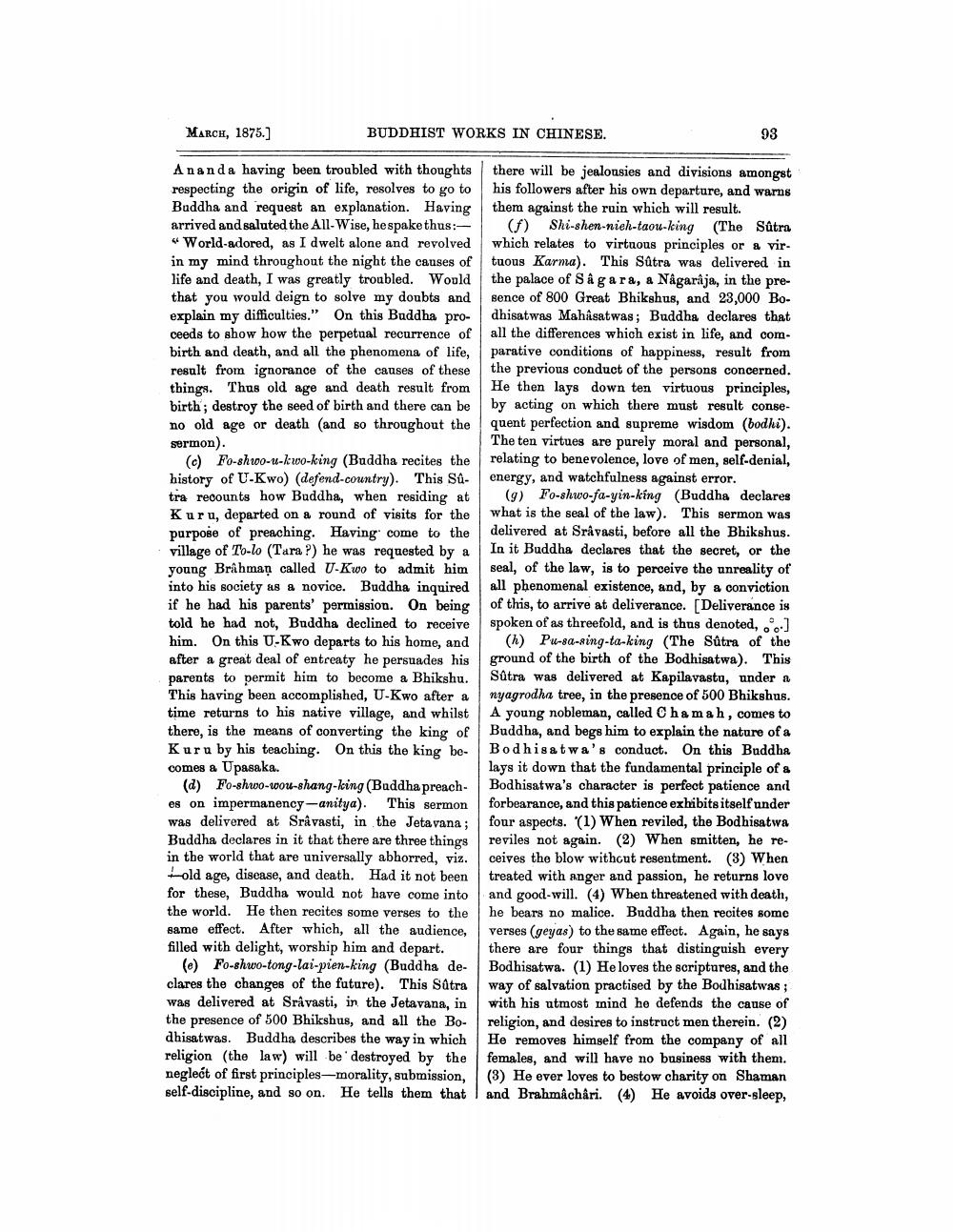________________
MARCH, 1875.)
BUDDHIST WORKS IN CHINESE.
93
Ananda having been troubled with thoughts there will be jealousies and divisions amongst respecting the origin of life, resolves to go to his followers after his own departure, and warns Buddha and request an explanation. Having them against the ruin which will result. arrived and saluted the All-Wise, hespake thus:- (f) Shi-shen-nien-taou-king (The Sûtra 4 World-adored, as I dwelt alone and revolved which relates to virtuous principles or a virin my mind throughout the night the causes of tuous Karma). This Sätra was delivered in life and death, I was greatly troubled. Would the palace of Sågara, a Nagaraja, in the prethat you would deign to solve my doubts and sence of 800 Great Bhikshus, and 23,000 Boexplain my difficulties." On this Buddha pro- dhisatwas Mahasatwas; Buddha declares that ceeds to show how the perpetual recurrence of all the differences which exist in life, and combirth and death, and all the phenomena of life, parative conditions of happiness, result from result from ignorance of the causes of these the previous conduct of the persons concerned. things. Thus old age and death result from He then lays down ten virtuous principles, birth; destroy the seed of birth and there can be by acting on which there must result conseno old age or death (and so throughout the quent perfection and supreme wisdom (bodhi). sermon).
The ten virtues are purely moral and personal, (c) Fo-shwo-u-kwo-king (Buddha recites the relating to benevolence, love of men, self-denial, history of U-Kwo) (defend-country). This Sû- energy, and watchfulness against error. tra recounts how Buddha, when residing at (9) Fo-shwo-fa-yin-king (Buddha declares Kuru, departed on a round of visits for the what is the seal of the law). This sermon was purpose of preaching. Having come to the delivered at Sråvasti, before all the Bhikshus. village of To-lo (Tara?) he was requested by a In it Buddha declares that the secret, or the young Brahman called U-Kwo to admit him seal, of the law, is to perceive the unreality of into his society as a novice. Buddha inquired all phenomenal existence, and, by a conviction if he had his parents' permission. On being of this, to arrive at deliverance. [Deliverance is told he had not, Buddha declined to receive spoken of as threefold, and is thus denoted, ...) him. On this U-Kwo departs to his home, and (h) Pu-sa-sing-ta-king (The Sûtra of the after a great deal of entreaty he persuades his ground of the birth of the Bodhisatwa). This parents to permit him to become a Bhikshu. Satra was delivered at Kapilavastu, under a This having been accomplished, U-Kwo after a nyagrodha tree, in the presence of 500 Bhikshus. time returns to his native village, and whilst A young nobleman, called Chamah, comes to there, is the means of converting the king of Buddha, and begs him to explain the nature of a Kuru by his teaching. On this the king be- Bodhisatwa's conduct. On this Buddha comes a Upasaka.
lays it down that the fundamental principle of a (d) Fo-shwo-wou-shang-king (Buddha preach- Bodhisatwa's character is perfect patience and es on impermanency-anitya). This sermon forbearance, and this patience exhibits itself under was delivered at Sråvasti, in the Jetavana ; four aspects. (1) When reviled, the Bodhisatwa Buddha declares in it that there are three things reviles not again. (2) When smitten, he rein the world that are universally abhorred, viz. ceives the blow withcut resentment. (8) When -old age, disease, and death. Had it not been treated with anger and passion, he returns love for these, Buddha would not have come into and good-will. (4) When threatened with death, the world. He then recites some verses to the he bears no malice. Buddha then recites some same effect. After which, all the audience, verses (geyas) to the same effect. Again, he says filled with delight, worship him and depart. there are four things that distinguish every
(e) Fo-shwo-tong-lai-pien-king (Buddha de- Bodhisatwa. (1) He loves the scriptures, and the clares the changes of the future). This Satra way of salvation practised by the Bodhisatwas; was delivered at Sråvasti, in the Jetavana, in with his utmost mind he defends the cause of the presence of 500 Bhikshus, and all the Bo- religion, and desires to instruct men therein. (2) dhisatwas. Buddha describes the way in which He removes himself from the company of all religion (the law) will be destroyed by the females, and will have no business with them. neglect of first principles-morality, submission, (3) He ever loves to bestow charity on Shaman self-discipline, and so on. He tells them that I and Brahmachari. (4) He avoids over-sleep,




